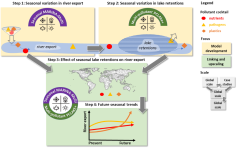
Project
Another season, another cocktail: Modelling seasonal effects of lake retention on river export of pollutants
Water pollution is a global challenge. Human activities on land emit pollutants such as nutrients, pathogens, and plastics. This cocktail of pollutants enters our rivers and lakes. However, another season may bring another cocktail of pollutants to rivers and lakes due to changes in human activities (e.g. fertilizer usage in spring) and climate (e.g. increased precipitation). My PhD research aims to better understand how seasonality in lake retentions affects river export of multiple pollutants worldwide today and in the future.
Introduction
Worldwide, human activities emit multiple pollutants including nutrients, pathogens, and plastics to our rivers and lakes. This mixture of pollutants forms a cocktail with many interactions. However, another season may bring another cocktail, posing multiple impacts on nature (e.g. eutrophication from nutrients) and society (e.g. diarrhea from waterborne pathogens). Rivers export pollutants from land to sea. In this export, lakes serve as sinks to store pollutants. Lake retentions are seasonal (e.g. lower nutrients retention with low temperatures), affecting river export of pollutants. As a result, the composition of the pollutant cocktail may change over seasons.
Objective
The current knowledge is still poor in understanding the seasonal effects of lake retentions on river export of pollutants. This especially holds for a global scale taking a multi-pollutant perspective. This challenges formulations of effective management strategies to ensure clean water across seasons. Global water quality models can help to get this knowledge, especially for data-scarce areas. However, such global models often focus on annual river exports of single pollutants and ignore seasonality in lake retentions. Therefore, this research aims to better understand how seasonality in lake retentions affects river export of multiple pollutants worldwide today and in the future.
Method
I will develop a novel, seasonal, multi-pollutant modelling approach that explicitly accounts for lake retentions. I will do this in four steps (see the conceptual framework in Figure 1). For this, I will further develop an existing substance flow model (MARINA-Multi) and an existing ecological model (PCLake+).

(Expected) results
My research will result in an integrated model system that provides novel insights into seasonal multi-pollutant flows in rivers and lakes. This will advance our knowledge on the seasonal effects of lake retentions on river exports of pollutants. This will aid policymakers in identifying management strategies to reduce seasonal water pollution for ecosystems and society.
More information